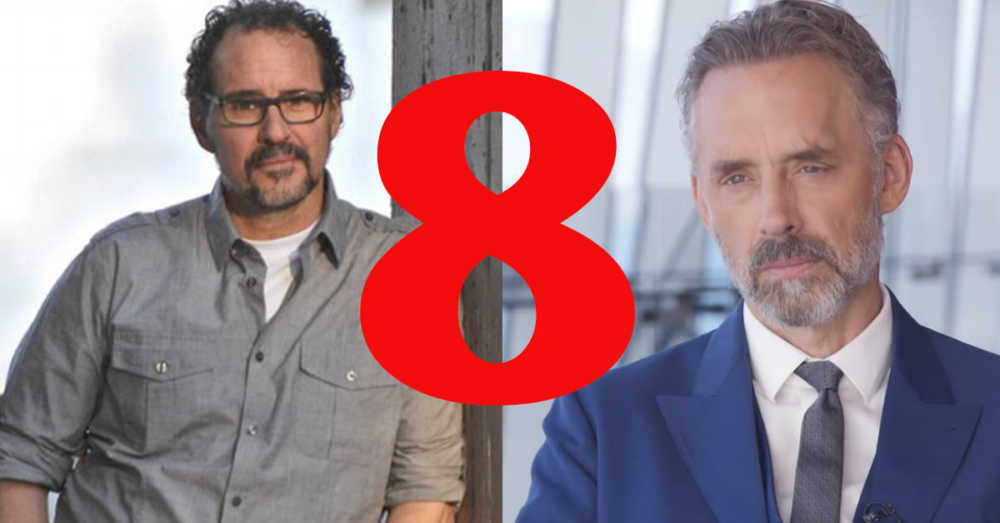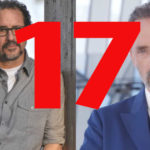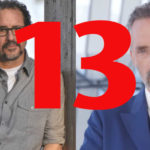We run our website the way we wished the whole internet worked: we provide high quality original content with no ads. We are funded solely by your direct support. Please consider supporting this project.

Part 8 (of 15): Race and Social Hierarchies
Assessing Jordan Peterson’s 12 Rules for Life
by Greg Boyd
“The degree to which the terrible part of the world manifests itself in your life is proportionate to how insufficient you are….If you got your act together completely, maybe all the suffering would disappear from your life, or at least all the unbearable suffering.”
Jordan Peterson
In this and the following several posts I will be critically evaluating aspects of Peterson’s thoughts on social hierarchies and related issues that we have discussed over the last three posts. In this and the following post, my critical evaluation will be based on reason alone, while my evaluation in the several posts that follow these will be from a distinctly Christian perspective.
The Necessary Balance of Order and Chaos
Before evaluating Peterson’s thoughts on social hierarchies and race, I want to briefly discuss two fundamental areas in which I am in full agreement with Peterson. First, I found a good deal of wisdom in Peterson’s repeated warnings not to disrespect the “known’ (order) and hastily launch into the “unknown” (chaos). He calls for a balanced approach to progress, and while I’m not sure he himself maintains this balance, as I’ll argue below, I agree, in principle, that our inclination to explore “unknown territory” needs to be balanced with the need to “respect the known” and maintain stability.
But this is not easily done. Numerous studies have shown that the brains of about half of the population are hard-wired to lean conservative, looking positively into the past, putting a premium value on stability, and viewing the future pessimistically, while the other half is hard-wired to lean liberal, looking negatively at the past, putting a premium on risk-taking, and viewing the future more optimistically (see: here).
There are, of course, many other factors that impact a person’s outlook (e.g., upbringing, social environment, personal experiences, their own reasoning process). And, of course, there is a continuum here, with only the extremes at both ends reflecting entirely conservative or entirely liberal impulses. But these studies nevertheless demonstrate that our brain’s hard-wiring inclines us toward one or the other of these two camps.
A healthy society needs both perspectives, for all the reasons Peterson has outlined. Without liberal minds decrying the injustices of the past and pulling conservative minds to explore the “unknown” in order to continually improve society, we could easily end up in a stagnant and oppressive social order. But without conservative minds appealing to the wisdom of the past and resisting the liberal pull to experiment with “the unknown,” we could easily end up destabilizing society and falling headlong into chaos.
To maintain this balance, however, both groups need to trust the good will of the other and communicate with each other in productive ways. As our current culture wars are making painfully obvious, this necessary trust can quickly disappear and, as a result, this necessary communication can quickly degenerate into name calling, label slapping, and demonizing the opposing sides. Each group thus decides the other is simply wrong, and so decide they must win.
We need to realize that this “must win” mindset simply ensures that we will all lose. As I read him, while Peterson’s main concern is with the liberals who have adopted the philosophy of deconstructionism and who are currently winning in the western Academy (which, he believes, means they will eventually win in the broader society), he is really trying to call for this balance. If his focus is more on the danger of social chaos swallowing up order than the other way around (and it is), this is because this is the threat western culture is currently facing.
Regardless of what one thinks of deconstructionism, this call for liberals and conservatives to begin to dialogue again is certainly on the mark. Having said this, however, I will register my opinion that I am deeply pessimistic about this ever happening. And my reason has to do with our brain’s circuitry and with Cable News.
MRI tests have demonstrated that when people confront alleged facts that challenged their deeply held beliefs, their amygdala, which is in charge of their “fight-or-flight” reflex, kicks into gear, and their pre-frontal lobe cortex, which is in charge of reasoning, tends to shut down. On the other hand, when people encounter alleged facts that confirm their deeply held beliefs, the pleasure centers of their brain gets activated, and their pre-frontal lobe cortex again tends to shut down (see: here). This is why it is very difficult to think objectively, or talk rationally, about beliefs we are passionate about.
Well, “back in the day” we had three television Networks, and it was in the interest of all of them to report the News with as little bias as possible to attract the widest possible audience. With the advent of Cable News, however, people are able to watch the filtered version of the News that they agree with and that therefore activates the pleasure centers of their brain. And when liberal and conservative minded people no longer have to try to see the world through each other’s eyes, they get hardened in their perspectives. In time, they lose the willingness, and then the ability, to understand the perspectives of those who fundamentally disagree with their deeply held beliefs. Those who oppose them, therefore, can’t possibly be doing so on rational or moral grounds, which means they must either be stupid or immoral. They therefore cannot be reasoned with. They must simply be defeated.
If someone has a practical solution as to how western culture can reverse this dire trend, they are smarter than me and should quickly make their solution known. I don’t mean to sound apocalyptic, but I seriously think western civilization, and especially America, is in serious trouble. Democracy depends on people trusting the good intentions of those they disagree with and on the general public relying on shared sources of information. All indications are that both of these preconditions for Democracy have deteriorated significantly over the last thirty years.
If your hope is anchored in Jesus Christ alone, as it should be, this grim forecast won’t undermine the peace and optimism that is part of your inheritance as a citizen of God’s Kingdom. The rise and fall of empires founded on violence – and they are all founded on violence- is as predictable as the rising and setting of the sun. Despite many desperately insisting otherwise, America will not likely prove to be an exception to this uniform rule, assuming the Lord doesn’t return in the next hundred or so years to fully establish the Kingdom.
If there is a glimmer of hope for this country and for western civilization itself, it resides in young people waking up to the insanity of what is happening. If sufficient numbers begin to realize how thoroughly people’s minds are being manipulated by cable News and social media and to the desperate need for the members of any democracy to be able and willing to rationally and calmly discuss their differences rather than demonizing one another on the basis of these difference, the ever-widening chasms that separate us could possibly begin to be reversed. The question boils down to this: Will westerners prove themselves to be smarter than the seductive lure of propaganda and fear and the idolatrous need to always be right?
Only time will tell.
The Harm of Ideologies
I also find Peterson’s critique of ideologies to be insightful. The appeal of ideologies is that they promise simple solutions to life’s miseries, but they do this by ignoring the complexity of reality and the inevitability of life’s miseries. Peterson notes that ideologies
…adopt a single axiom: government is bad, immigration is bad, capitalism is bad, patriarchy is bad. Then they filter and screen their experiences and insist ever more narrowly that everything can be explained by that axiom. They believe, narcissistically, underneath all that bad theory, that the world could be put right, if only they held the controls (211).
In the name of this axiom, the wisdom of the past is over-turned and a new order is socially engineered, which is why Peterson believes that ideologies always tend in a totalitarian direction. Ideologies create social chaos, and often massive violence, in the process of being adopted by a society, and the unnatural order they enforce creates still more horrors, as Peterson believes the twentieth century demonstrates.
I’ve already registered my reservations about blaming the horrors of the twentieth century on the ideology of nihilism. Indeed, one could argue that this perspective is itself an oversimplification that is rooted in an ideology. Be that as it may, I think Peterson’s critique of ideologies in general, and of the ideology of deconstructionism in particular, is on the mark. The complexity of reality always outruns the power of an idea to grasp it, regardless of how brilliant and comprehensive that idea may be, and it is sheer hubris, and exceedingly dangerous, to think otherwise.
Are Hierarchies Reflections of Competence?
Turning to Peterson’s thinking on hierarchies, we’ve seen that, while Peterson grants that hierarchies can be established for many bad reasons, in which case they are illegitimate, he nevertheless holds that hierarchies as such are entirely natural, both in the animal kingdom and in human society. They reflect the unequal abilities of humans when pursuing a common goal, with the more competent people rising to the top and the less competent sinking toward the bottom, in accordance with their ability.
I grant that it generally works this way in the animal world, and I grant that social hierarchies in society should operate this way. (In a subsequent post, I’ll argue that the Kingdom community is a different matter). But I contend that, in reality, competence is only one of a number of factors that determine one’s place in the hierarchy of a society, and it’s not necessarily the most important one.
To illustrate, it is beyond dispute that in America, white people, and especially white males, are statistically much more likely to enjoy the power and privilege of living higher up on the social scale, and to avoid the desperate disadvantages of living on the bottom, than blacks, Native Americans, and other non-white groups. To explain this disparity, one has to either appeal primarily to historical and social systemic explanations (e.g. it has something to do with white Europeans stealing land and enslaving people to establish this land as “their own”), in which case this privileging is unjust, or one has to appeal primarily to the competency and personal responsibility of each individual, in which case this privileging is perfectly natural. At least in 12 Rules of Life and in the videos I’ve viewed thus far, Peterson consistently appeals to the latter explanation.
Of course, no one would deny that innate abilities along with a person’s willingness to take responsibility for their life contribute to their social standing – unless, of course, they are in a situation as oppressive as slavery in the pre-abolition South, which rendered an individual’s abilities and personal responsibility all but irrelevant. And one can of course point to individual blacks, Native Americans, and/or other non-whites who, because of their exceptional competency, persistent hard work, and plain old good luck, “made it to the top.” But for every one of these exceptions, there are untold numbers who did not. And the question is, what explains this?
Speaking From a Position of White Privilege
And as I said, Peterson consistently appeals to personal responsibility and competence as the most important factor determining one’s place on any social hierarchy. In fact, in lectures and interviews Peterson sometimes gives the impression that he believes taking responsibility for your life and striving to increase your competence is the remedy for most, if not all, suffering in a person’s life. In a lecture on masculine and feminine archetypes, for example, Peterson says,
The degree to which the terrible part of the world manifests itself in your life is proportionate to now insufficient you are….If you got your act together completely, maybe all the suffering would disappear from your life, or at least all the unbearable suffering. (see: here)
This from the man who persistently rails against ideologues who try to fit the complexity of reality into the Procrustean Bed of a single idea! I have to assume Peterson is being somewhat hyperbolic here. In any event, I believe that Peterson’s constant appeal to individual responsibility and competence, along with his constant stress on not blaming society or anything else for one’s problems, leaves him vulnerable to the charge that he is naively reflecting a privileged white male perspective.
To be clear, I fully agree with Peterson that people should assume responsibility for their lives, and I fully appreciate Peterson’s concern about people falling into a victim mindset and blaming their problems on social injustices or on their personal misfortunes. No individual can hope to improve their life if they don’t take responsibility to change all that is in their power to change. Amen!
But it is all-too-easy for a white male like Peterson or myself to advocate this, for we white males usually have the power to take personal responsibility for a good portion of our lives. And this is why white people in general, and white males in particular, tend to assess social problems in individualistic rather than systemic terms. By contrast, blacks, Native Americans, and other people of color generally have much less power to do this, because they really are, to one degree or another, victims of a social system that was established by white people and that has always privileged white people.
This of course doesn’t mean that these people shouldn’t also take responsibility for their lives and work to improve their competency. But it does mean that their comparatively low position on the social hierarchy can’t be adequately explained by appealing to these factors.
A Valid Deconstructionist Critique
While I do not embrace the deconstructionists’ universal claim that all social hierarchies (as well as all social categories and values) are constructed by people in power to advantage some and disadvantage others, I think the deconstructionist’s critique is, to a large degree, valid on matters of race in the United States. America was conquered and structured by white Europeans with the explicit understanding that it was “manifest destiny” – viz. it was obvious to these white people — that whites were superior to all others and should therefore rule over all others. From centuries of forced slavery, to the reconstruction era, to the hiring out of inmates in the early twentieth century, to Jim Crow, up to the so-called “War on Drugs” which has lead to the mass incarceration of blacks today, the history of America has been, to a frightful degree, a tragic history of whites trying to prove the “manifest destiny” doctrine true by keeping blacks from power.(1)
Of course, there are, and have always been, other things going on as well. We have to resist oversimplification on all sides. But I submit that America’s racist history and the racist hierarchy that it created and yet sustains goes much further in explaining why blacks, Native Americans and other non-white groups tend to live toward the bottom of America’s social hierarchy while whites tend to live toward the top than does appealing to personal responsibility or the competency of the individuals who comprise these groups.
Indeed, when a person whose ethnic group has for centuries suffered from the white structured social hierarchy hears a white male like Peterson suggest that “[t]he degree to which the terrible part of the world manifests itself in your life is proportionate to how insufficient you are,” and that all their suffering might “disappear” if they “got [their] act together completely,” it only serves to confirm the reality of the systemic white privilege that the individualistic explanation for ethnic disparities tends to ignore.
The Choice
And now things get even more dicey. If a person minimizes historical and systemic factors to explain ethnic disparities on a social hierarchy and instead appeals primarily to personal responsibility and competency, they are in effect saying, however unwittingly, that the individuals that comprise these ethnic groups just tend to be less competent and responsible than whites or others who are higher up the social hierarchy. Peterson would of course deny that the tendencies of individuals within any given ethnic group are rooted in “race.” He rather insists that they are due to a multitude of complex factors that are left unexplored if we stop with the “race” conclusion, things such as the culture, work ethic, values, or average intelligence of each particular ethnic group.(2)
I don’t deny the significance of these variables (though I’ll admit I’m skeptical of IQ tests), but it seems to me this just kicks the can one step further down the road. For here again we have a choice to make. We can either appeal to historic and systemic aspects of society to help explain why the culture, work ethic, and values of a particular ethnic group are the way they are and why this results in their being lower on the hierarchy of social privilege and power. If we reject that conclusion, however, we are left only with the option of concluding that these variables are innate to the ethnic group itself, which, it seems to me, is just another way of stopping at the “race” conclusion.
I want to be clear that I am not labeling Peterson a racist, though, for all the reasons I have given, I don’t think it’s incomprehensible why this charge is frequently leveled against him. The logic inherent in this thinking about hierarchies, individual responsibility and competency moves in this direction, especially when considered alongside his constant call for individuals to stop blaming society for their misfortunes.
There is a reason why white supremacist groups are attracted to him.
And it does help that Peterson is adamantly opposed to the concept of white privilege, which is the topic of our next post.
___ ___ ___
(1) See M. Alexander, The New Jim Crow: Mass Incarceration in the Age of Colorblindness (New York: The New Press, 2012).
(2) While he treads careful around the topic, Peterson believes different “races” have non-trivial differing average IQ’s, and he’s very confident that IQ tests are unbiased and reliable. See: HERE and HERE
Category: General
Tags: Book Reviews, Books, Jordan Peterson
Related Reading

Part 7 (of 15): Hierarchies, Masculinity, and Femininity
Assessing Jordan Peterson’s 12 Rules for Life by Greg Boyd “Do male crustaceans oppress female crustaceans? Should their hierarchies be upended?” In the previous two posts we reviewed Peterson’s conception of life as a delicate balancing act between order and chaos (post 5) and we’ve explored how he applies this conception to biological and cultural…

Satan and the Problem of Evil Endorsements
Endorsements: “Greg Boyd has shown us that the most powerful way to view God in a postmodern world is through the eyes of the warfare worldview of Scripture. This biblical argument not only makes sense of our ravaged world, it turns us to the only hope we have–a world whose end is in the hand…

Podcast: The Making of Crucifixion of the Warrior God with Tony Jones
Dan and Tony talk about Greg’s books Crucifixion of the Warrior God and Cross Vision. Tony reveals what it was like to work with Greg, what the publishing industry is like right now, and what prospective authors can do to publish their own book. Tony’s recent book is available here: Did God Kill Jesus http://traffic.libsyn.com/askgregboyd/Episode_0423b.mp3…

A Book That Won’t Leave You Unchanged
St. Ignatius of Loyola, the 16th century founder of the Jesuits, taught that to experience the transforming power of Scripture, we need to read it “with all five senses,” using our imagination to get on the inside of the characters and story we’re reading about. A just-released book by Frank Viola and MaryDeMuth entitled “The…

Part 17 (of 20)- Jordan Peterson on God
Assessing Jordan Peterson’s 12 Rules of Life “God, whoever or whatever he may be, is no simple granter of wishes.” Jordan Peterson In this post I would like to review and evaluate what Peterson has to say about God and in the following post I will do the same for what Peterson has to say…

Part 13 (of 15)— Taking Responsibility (Part A)
Assessing Jordan Peterson’s 12 Rules for Life by Greg Boyd “If you’re not the leading man in your own drama, you’re a bit player in someone else’s.” Jordan Peterson If I had to sum up the essence of Peterson’s philosophy in a single sentence, it would be: “Take responsibility for your own life.” In this…
